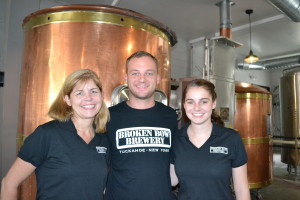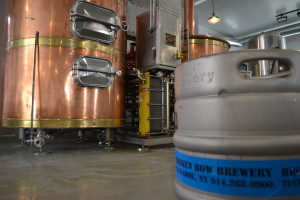Broken Bow Brewery opens in Tuckahoe
According to legend, Arthur Guinness chose the location for his brewery in the St. James”™s neighborhood of Dublin because of its access to the Wicklow Mountains springs, where the water was pure, soft and the perfect start to a good beer.
Water was also a factor for the LaMothe family when it agreed on a spot for its Broken Bow Brewery, which opened last month in Tuckahoe. Michael LaMothe, head brewer, said Tuckahoe water is suitable for various styles of beer because of its neutral flavor and low mineral content.
“It allows us to fine-tune what we”™re doing,” he said.
Gas service lines, an ample parking lot, abundant electricity and space to install large copper vats and smaller cooling pipes were also deciding factors when looking at potential sites in Westchester County. After whittling down their choices, the family decided on the 7,500-square-foot space in a former tile warehouse on Marbledale Road, an industrial corridor that was once the location of Tuckahoe”™s storied marble quarries.

The brewery is open to the public for tasting and the entire brewing process from start to fermentation is on display. Michael”™s sister Kasey LaMothe, who is the brewery”™s head of microbiology and quality control, said that visitors often walk into the space and head straight for the series of pipes and vats in the back of the room.
“A lot of people walk right by the bar, they look like they”™re meeting someone,” she said. What they are doing is looking at the vats, in awe of the brewing process the way a tourist in Times Square looks skyward oblivious to the throngs of people dodging them.
First, grains are ground and piped from a back room into large copper tanks in the main room. A regular batch, which produces roughly 310 gallons or 3,500 cans, may need 600 to 1,000 pounds of grain depending on the type of beer being made (more grain also means more alcohol content). Water boils to produce wort, a sugary liquid.
Hops are added to begin the fermenting process and the wort is cooled. Depending on what type of beer is being brewed, the liquid sits in a fermenter for four days or as long as two weeks. The temperature during the process also varies, with tubes sweating condensation as they cool down the wort in the larger vats.
The brewery buys its hops and grains from providers in Europe and America, but with a “hop renaissance” reportedly getting a foothold in New York state, Broken Bow is in talks to include more locally grown products in the brewing process.
The last stops on the way to the frosty mug are vats called bright tanks. Broken Bow”™s brights were manufactured in Germany and used by a brewery in Japan. Even now, the shiny silver tubes are marked in Japanese lettering.
A mechanism from the bright tanks that resembles a giant auger was replaced and the LaMothes made it into a table near the main entrance of the brewery. An oversized industrial sink from the tile warehouse is now a decorative addition behind the bar. Even outside of the machinery, each piece of furniture comes with a story of its own.
Interest in Broken Bow”™s facilities comes as commercial beer distributors struggle and craft and homebrewers thrive. In the first half of 2013, small and independent American brewers saw volume increase by 13 percent and dollar sales upped 15 percent, according to the National Beer Wholesalers Association, which represents 3,300 independent beer distributors. Many of the curious visitors to Broken Bow since its openings have been homebrewers in awe of seeing a brewing process firsthand. Michael LaMothe can sympathize, having brewed his first beer on a stovetop in his old apartment in Stamford 10 years ago.
Using a homebrewing kit, he added a packet of syrup and boiled water to make his first beer. The first batch was tasty enough, but then came the second batch to which he added honey. “It was one of the worst things I ever drank,” he said. From there, he became a student of the science behind brewing, although he said he hasn”™t lost his sense of creativity.

“It”™s a lot of science and it”™s a lot of art,” he said.
Soon, homebrewing became a family affair. Michael”™s parents, Kathy and Lyle, knew they were onto something bigger than homebrewing when they held a New Year”™s Eve party. Kathy LaMothe joked that the guests seemed to enjoy the beer ”“ really, really enjoy the beer. “Luckily everyone was staying overnight,” she said.
Lyle is now head of operations and sales, Kathy is head of administration and Kristin Stone, Michael and Kasey”™s sister, is the head of marketing. Kathy LaMothe said the entire family came to a point in their lives where they all seemed willing to do something new.
“We said, ”˜What do we do?”™” she said. “Now we look back and say ”˜what did we do?”™”
It has been a whirlwind and a learning process for the family getting started, going through approvals and permitting processes. “The beer we knew,” she said, “we figured everything else we could do.” The brewery name came from Broken Bow, Neb., where Kathy grew up.
In the early goings, Broken Bow has focused on producing Broken Heart Stout, Marbledale Pale Ale and Broken Auger Lager. Seasonal brews, such as an Oktoberfest, will also be a focus. The brewery is prepared to install machinery that produces cans, which Broken Bow hopes to supply to local markets. (Craft brewers say cans are a better container for beer than bottles because it keeps out air and sunlight to keep the beer fresh tasting).
Broken Bow”™s beer is already available in a number of Westchester bars and eateries, including Stephen”™s Green on nearby Fisher Avenue and Growler”™s, the craft beer bar that opened near Tuckahoe”™s train station.
The brewery is open Tuesdays, Wednesdays and Thursdays from 3 to 8 p.m. and Fridays and Saturdays from 1 to 8 p.m.